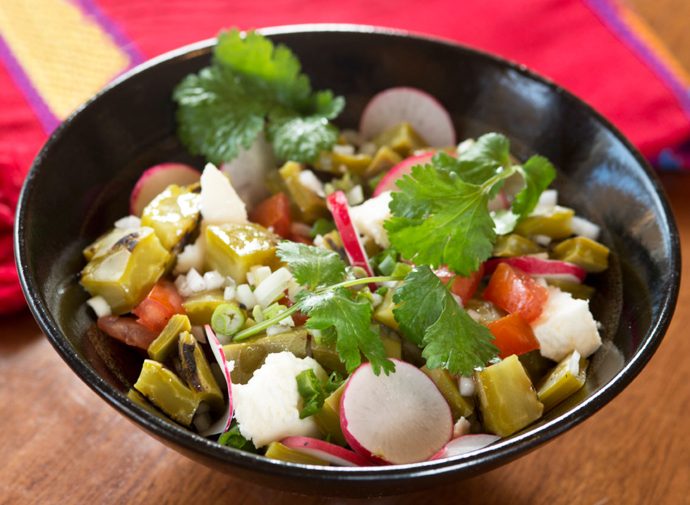In La Merced, nopales, or cactus paddles, are beautifully displayed in towering stacks. You can see vendors prepping the cactus for their customers. With a very sharp knife, the spines are shaved off the paddles and a thin strip is cut off all the way around the edge. They are also sold cleaned, cut into small dice, and packaged in plastic bags. Nopales are common now in Mexican markets in the U.S. Look for medium-sized, whole paddles, 2 to 3 ounces each, that are fairly rigid and have the spines removed.
Nopales share a characteristic with okra. They exude a viscous liquid as they cook giving them an unpleasant slithery texture. To avoid this, I roast cleaned paddles on a grill or in a lightly greased sauté pan until they are tender and the flesh changes color from bright green to a yellowish hue with patches of char. Nopales have a pronounced citrus taste, similar to tomatillos, and a meaty texture. They are good for people with high blood sugar, which is a condition prevalent in Native Americans who have been overexposed to European food. Rick Bayless suggests cutting the cactus into squares and roasting them on a baking sheet, seasoned with a little salt and oil, in a 375° oven until tender and all the sticky liquid that exudes during cooking has evaporated, about 20 minutes.
Cactus Salad
Ingredients
3 or 4 cups of diced cactus paddles, grilled or roasted
3 Tbl chopped cilantro
½ cup diced white onion
½ cup diced fresh tomato
½ cup thinly sliced radishes
2–4 Tbl finely crumbled Mexican queso anejo or Parmesan
2–4 Tbl vegetable oil
Salt and pepper to taste
Instructions
Cut cooked cactus paddles into medium dice and combine with the other ingredients. Add salt and freshly ground pepper to taste.


Great new issue, and love the new condensed format!
Jef Heidekat